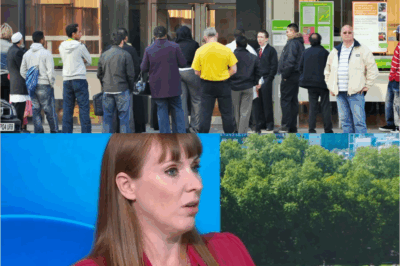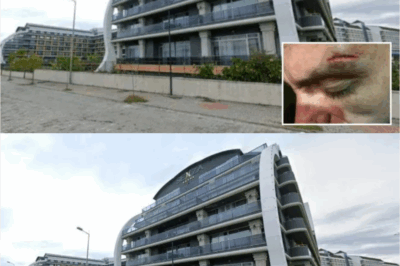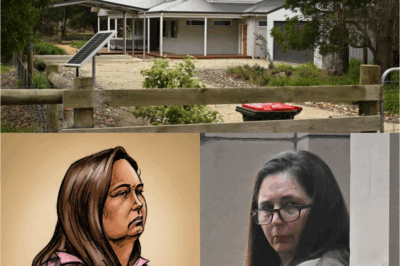Denise Welch of Loose Women Shares Her Experience with ‘Coercive Control,’ Saying, ‘You Can’t See the Bruises’

In a powerful episode of the daytime talk show “Loose Women,” Denise Welch bravely opened up about her past struggles with domestic abuse, particularly focusing on the often-overlooked aspect of coercive control.
As part of the show’s impactful “Facing It Together” campaign, she aimed to shed light on these hidden forms of abuse that can leave lasting emotional scars.
The poignant statement, “you can’t see the bruises,” encapsulates the unseen psychological trauma that many victims endure, distinguishing it from more visible physical violence.
The Hidden Reality of Coercive Control

Denise Welch’s testimony provides a stark reminder that domestic abuse is not always physical. She recounted her harrowing experiences in a relationship marked by emotional manipulation and coercive control.
While there were instances of physical confrontations, the real struggle lay in the way her partner psychologically undermined her self-esteem and sense of worth.
Welch described how her partner’s jealousy and obsessive behaviors led her to question her friendships and even her identity.
Coercive control can manifest in various forms, including emotional blackmail, isolating behaviors, and the systematic erosion of a victim’s confidence.
Denise’s story illustrates how these tactics can create a psychological prison, making it incredibly challenging for victims to recognize their situation or find a way out.
Such insights are crucial for raising awareness, as many individuals may not understand the subtleties of emotional abuse until they hear firsthand accounts like Welch’s.
Statistics and Awareness on Domestic Abuse

The discussion on “Loose Women” also involved a deeper look at the statistics surrounding domestic abuse. Panel member Charlene White shared alarming figures indicating that one in four women and one in seven men in England and Wales will face domestic abuse at some point in their lives.
These statistics reveal a grim reality that underscores the urgency of addressing this issue.
The show highlighted that certain groups face greater risks, particularly individuals with disabilities, who are reported to be three times more likely to experience domestic abuse.
By sharing statistics and personal stories, the show aims to combat the stigma surrounding abuse and encourage victims to speak out and seek help.
The Journey of Healing and Advocacy

Denise Welch’s candid sharing of her experiences serves as an important reminder of the complexity involved in leaving an abusive relationship. Emotional attachments, fear, and manipulation often create significant barriers to escaping such situations.
Welch’s narrative emphasizes that breaking free from coercive control is not simply about physical escape; it also involves a long journey of psychological healing and self-discovery.
The importance of raising public awareness can’t be overstated. Initiatives like “Facing It Together” play a crucial role in normalizing conversations about domestic abuse and coercive control.
They strive to empower survivors to reclaim their narratives, reinforcing the message that support is available and that they are not alone.

Denise Welch’s brave recounting of her experiences with coercive control sheds light on the emotional struggles faced by many in similar situations.
By discussing these hidden abuses, she not only empowers herself but also inspires countless others to confront their realities.
It’s essential that we continue to foster open discussions around such topics and support initiatives aimed at supporting victims of domestic abuse.
News
“BANKRUPT BRITAIN?!” – Labour’s Plan to WATER DOWN Its Already Flimsy Welfare Reforms Could HURL the UK Into TOTAL FINANCIAL MELTDOWN
LABOUR is making a complete mess of welfare. Panicked and driven Left-wards by Reform’s surge, the Government is wobbling on the…
“TURKISH HOTEL TERROR!” – Brit Dad Brutally BEATEN TWICE in Front of His Kids… Family Holiday Spirals into a Living Nightmare
The alleged attackers reportedly had a feared reputation A DAD-OF-TWO said he was attacked twice in front of his kids…
“FED to PIRANHAS!” – 31-Year-Old Mum of 3 Vanishes After Ex’s Savage Revenge… Body Still Missing in Brazil
A MAN was caught on CCTV putting his former wife’s body in the boot of a car before coldly dumping…
“Dinner Party of DEATH!” – You Won’t Believe Erin Patterson’s Gross Confession After Her ‘Killer’ Mushroom Meal Claimed 3 Lives
MUSHROOM cook Erin Patterson who is accused of killing three people with a poisoned beef wellington graphically described how she…
HOLIDAY BLOODBATH! Teen SLASHED to Death with Broken Bottle in Lisbon—UK Tourist (27) DRAGGED Back to Portugal in Dramatic Midnight Extradition
Daniel was reportedly attacked while trying to defend a friend A BRITISH tourist has been arrested and extradited to Portugal…
LIVERPOOL PARADE CARNAGE! 53-Year-Old Driver PLOUGHS into Crowd—47 Injured, 4 Kids Hurt—Police Shout “NOT TERROR!” Fans in SHOCK
Emergency crews arrived to find people lying injured in the road and some trapped under the car FOUR children were…
End of content
No more pages to load












